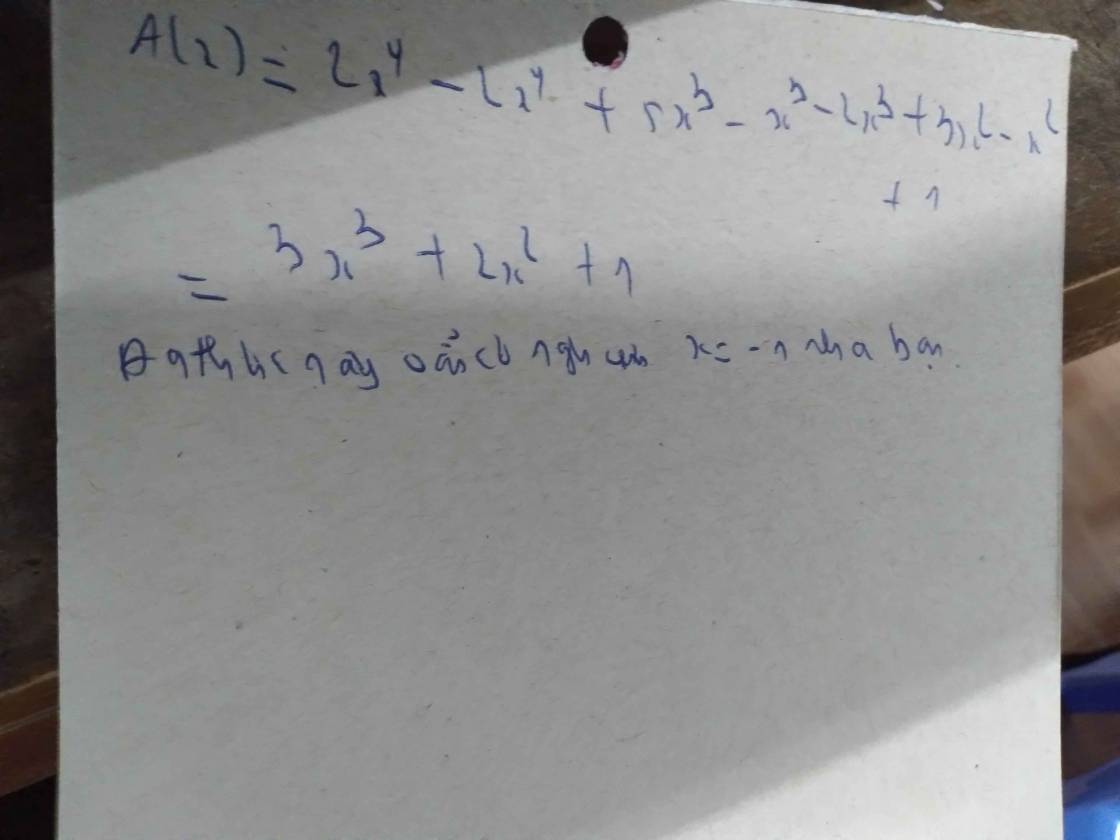Hãy nhập câu hỏi của bạn vào đây, nếu là tài khoản VIP, bạn sẽ được ưu tiên trả lời.

\(4)D=x^2+x+1\)
\(D=x^2+2x.\frac{1}{2}+\left(\frac{1}{2}\right)^2-\left(\frac{1}{2}\right)^2+1\)
\(D=\left(x+\frac{1}{2}\right)^2-\frac{1}{4}+1\)
\(D=\left(x+\frac{1}{2}\right)^2+\frac{3}{4}\)
Vậy biểu thức trên luôn nhận giá trị dương với mọi giá trị của x.
Các câu khác lm tương tự nhé.
Cho góp ý xíu: lần sau bn đưa từng câu một lên diễn đàn thì sẽ có câu trả lời nhanh hơn là đưa cùng một lúc như thế này đấy
hok tốt~
\(D=x^2+x+1=x^2+x+\frac{1}{4}+\frac{3}{4}=\left(x+\frac{1}{2}\right)^2+\frac{3}{4}\)
\(\left(x+\frac{1}{2}\right)^2\ge0\forall x\Rightarrow\left(x+\frac{1}{2}\right)^2+\frac{3}{4}\ge\frac{3}{4}>0\forall x\)( đpcm )
\(F=2x^2+4x+3=2\left(x^2+2x+1\right)+1=2\left(x+1\right)^2+1\)
\(2\left(x+1\right)^2\ge0\forall x\Rightarrow2\left(x+1\right)^2+1\ge1>0\forall x\)( đpcm )
\(G=3x^2-5x+3=3\left(x^2-\frac{5}{3}x+\frac{25}{36}\right)+\frac{11}{12}=3\left(x-\frac{5}{6}\right)^2+\frac{11}{12}\)
\(3\left(x-\frac{5}{6}\right)^2\ge0\forall x\Rightarrow3\left(x-\frac{5}{6}\right)^2+\frac{11}{12}\ge\frac{11}{12}>0\forall x\)( đpcm )
\(H=4x^2+4x+2=4\left(x^2+x+\frac{1}{4}\right)+1=4\left(x+\frac{1}{2}\right)^2+1\)
\(4\left(x+\frac{1}{2}\right)^2\ge0\forall x\Rightarrow4\left(x+\frac{1}{2}\right)^2+1\ge1>0\forall x\)( đpcm )
\(K=4x^2+3x+2=4\left(x^2+\frac{3}{4}x+\frac{9}{64}\right)+\frac{23}{16}=4\left(x+\frac{3}{8}\right)^2+\frac{23}{16}\)
\(4\left(x+\frac{3}{8}\right)^2\ge0\forall x\Rightarrow4\left(x+\frac{3}{8}\right)^2+\frac{23}{16}\ge\frac{23}{16}>0\forall x\)( đpcm )
\(L=2x^2+3x+4=2\left(x^2+\frac{3}{2}x+\frac{9}{16}\right)+\frac{23}{8}=2\left(x+\frac{3}{4}\right)^2+\frac{23}{8}\)
\(2\left(x+\frac{3}{4}\right)^2\ge0\forall x\Rightarrow2\left(x+\frac{3}{4}\right)^2+\frac{23}{8}\ge\frac{23}{8}>0\forall x\)( đpcm )

a/ Ta có: P(x)=0
nên 4x2 - 3x=0
do đó: 4xx-3x=0
(4x-3)x=0
Suy ra: 4x-3 = 0 hoặc x=0
=> x=\(\dfrac{3}{4}\) hoặc x=0
Vậy x=\(\dfrac{3}{4}\) hoặc x=0 là nghiệm của P(x)
b/ P(x)=0
2x2-8x=0
Nên (2x-8)x=0
=> 2x-8=0 hoặc x=0
Do đó: x=4 hoặc x=0
Vậy x=4 hoặc x=0 là nghiệm của P(x)
c/ P(x)=0
7x-2x2=0
(7-2x)x=0
Nên 7-2x=0 hoặc x = 0
Do đó: x=\(\dfrac{7}{2}\) hoặc x = 0
Vậy x=\(\dfrac{7}{2}\) hoặc x = 0 là nghiệm của P(x)
d/ Ta có: P(x)=0
nên \(\dfrac{3}{4}x-\dfrac{1}{2}x^2=0\)
\(\left(\dfrac{3}{4}-\dfrac{1}{2}x\right)x=0\)
Do đó: \(\dfrac{3}{4}-\dfrac{1}{2}x=0\) hoặc x=0
Suy ra: x= \(\dfrac{3}{2}\) hoặc x=0
Vậy x= \(\dfrac{3}{2}\) hoặc x=0 là nghiệm của P(x)

1: \(D=x^2+x+\dfrac{1}{4}+\dfrac{3}{4}=\left(x+\dfrac{1}{2}\right)^2+\dfrac{3}{4}>0\)
6: \(F=2\left(x^2+2x+\dfrac{3}{2}\right)=2\left(x^2+2x+1+\dfrac{1}{2}\right)\)
\(=2\left(x+1\right)^2+1>0\)
7: \(=3\left(x^2-\dfrac{5}{3}x+1\right)\)
\(=3\left(x^2-2\cdot x\cdot\dfrac{5}{6}+\dfrac{25}{36}+\dfrac{11}{36}\right)\)
\(=3\left(x-\dfrac{5}{6}\right)^2+\dfrac{11}{12}>0\)
8: \(=4x^2+4x+1+1=\left(2x+1\right)^2+1>0\)
